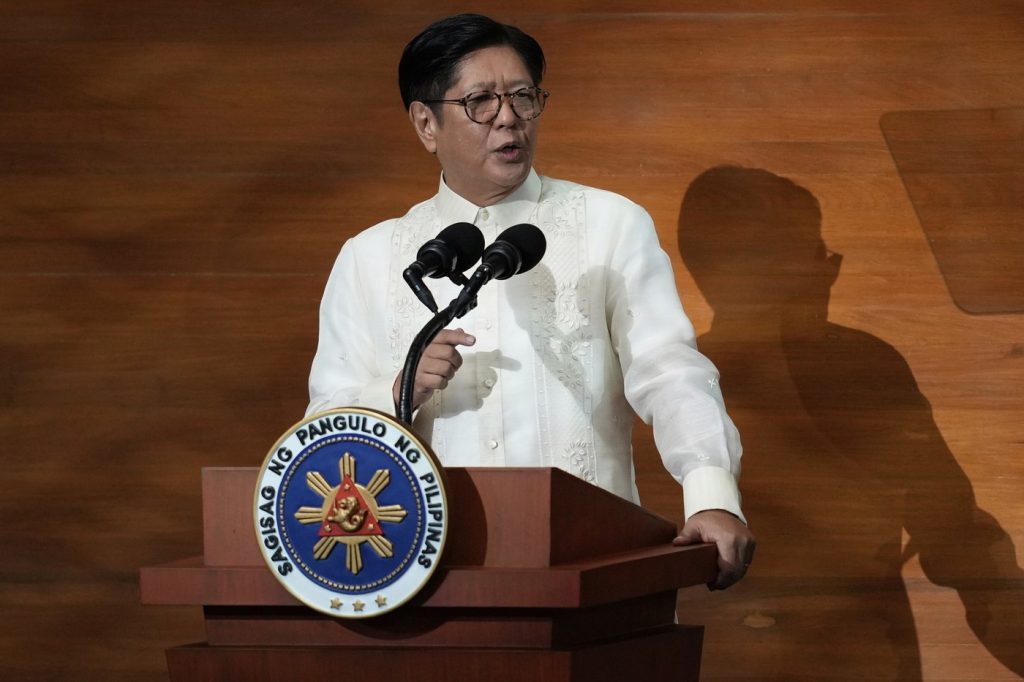MANILA, Philippines (AP) — Philippine President Ferdinand Marcos Jr. delivered his State of the Nation Address while facing multiple pressing challenges midway through his six-year term. Among these crises are recent deadly storms that left over 120,000 people in emergency shelters, complex relations with Vice President Sara Duterte, and escalating territorial conflicts with Beijing regarding the South China Sea.
In preparation for Marcos’ address to both chambers of Congress, as well as high-ranking government and military officials, around 22,000 police officers were deployed to secure the House of Representatives complex in suburban Quezon City, located in the capital region. Meanwhile, thousands of protesters gathered to express their demands, which ranged from calls for higher wages amid soaring inflation to the urgent impeachment trial of Vice President Duterte over numerous alleged offenses.
Marcos, who assumed power in mid-2022, represents a remarkable political comeback more than 30 years after his father was ousted from office during a military-backed “People Power” revolution. However, the new administration grappled with a plethora of inherited issues. The economy was one of the hardest hit by the COVID-19 pandemic, resulting in increased levels of poverty, unemployment, inflation, and hunger.
Initially, Marcos appeared to form a strong political alliance with Sara Duterte, but this partnership swiftly deteriorated. Duterte and her family, including former President Rodrigo Duterte, have emerged as some of Marcos' most vocal critics. The former president was apprehended in March during a chaotic incident at Manila's international airport and subsequently transferred to the Netherlands, where he is being detained by the International Criminal Court for alleged crimes against humanity stemming from his controversial anti-drug campaign.
In February, Sara Duterte made history as the first vice president of the Philippines to be impeached by the House of Representatives, which is dominated by allies of President Marcos. Her impeachment stems from various allegations, including accusations of large-scale corruption and threats against Marcos, his wife, and fellow government officials regarding her safety amid prevailing disputes.
Recently, the Supreme Court ruled that the impeachment case against her was unconstitutional due to a key procedural oversight, which has stalled her expected trial in the Senate, now serving as an impeachment tribunal. House lawmakers expressed plans to appeal this decision.
In contrast to his predecessor, who maintained close ties with China and Russia, President Marcos has taken steps to broaden the Philippines' alliance with the United States. He has worked to deepen security partnerships with countries like Japan, Australia, New Zealand, Canada, and France to counter increasingly assertive actions by China in the contested South China Sea. This shift in approach has further strained relations between Manila and Beijing.
Defense Secretary Gilberto Teodoro remarked that the current administration intends to reorient the military's focus from combating domestic insurgencies to addressing external threats, particularly in the South China Sea. He affirmed the Philippines' commitment to resisting Chinese aggression in the region, referred to by the Philippines as the West Philippines Sea.
Recently, U.S. President Donald Trump hosted Marcos at the White House to discuss tariffs, trade, and the enhancement of their bilateral treaty alliance. After returning to Manila, President Marcos visited an evacuation center to distribute food and aid to families displaced by consecutive storms and extensive monsoon rains, which caused severe flooding across vast areas of northern Luzon, including Manila. Over 6 million people have been affected by these natural disasters, which resulted in over 30 fatalities, primarily due to drownings, landslides, and fallen trees.










